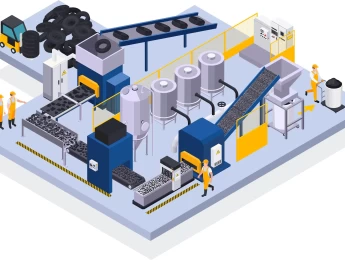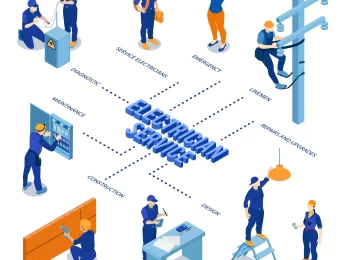Electrical engineering is an extremely necessary practice, yet one that requires great skill. This is especially true when installing electrical systems on construction sites.
Electricians tasked with this goal must be highly competent in the Health and Safety regulations that apply to their industry, and the individual requirements for certain components within the electrical system in creation. This knowledge is essential due to the nature of the work, and any faults can potentially cause great harm.
The role of construction site control is to ensure that the electrical system follows H&S regulations and meets the site’s specific standards. The system needs to meet the site's requirements and ensure that productivity is not prohibited by any electrical challenges. Once installed, all electrical devices need constant monitoring and maintenance to keep them at maximum efficiency.
Upon completion of this course, participants will be able to:
- Introduce the principles for a site electrical system.
- Explain why site electrical systems are designed in a certain manner to maintain safety and durability.
- Review the key elements of the electrical system.
- Demonstrate how a lock and tag system can be safe for all users.
- Understand how to size electrical cables based on voltage and carrying capacity.
- Explain the guidelines of how to size circuit breakers and generators.
- Describe how power should be distributed within a construction site.
- Be knowledgeable of the Wiring Requirements and other related health and safety regulations.
- Be competent in the electrical equipment used.
This course is designed for anyone on a construction site responsible for the electrical system design. It would be most beneficial for:
- Electrical Engineers
- Health and Safety Officers (HSOs)
- Senior Engineers
- Construction Site Managers
- Site Supervisors
- Project Engineers
- Electrical Engineer Technician
- Engineer Managers
This course uses a variety of adult learning styles to aid full understanding and comprehension. Participants will observe practical demonstrations highlighting the types of electrical systems and the safety measures that must be taken to ensure all risks are completely minimised.
They will be provided many tools necessary to understand the taught content thoroughly. Through practical activities, participants can directly practice skills taught within a safe environment directly. They will also have ample opportunities to review regulations and ensure their practice follows them as closely as possible. This will ensure all participants can gain a complete and well-rounded understanding of the knowledge and skills.
Day 5 of each course is reserved for a Q&A session, which may occur off-site. For 10-day courses, this also applies to day 10
Section 1: Introduction to Site Electrical Systems
- Introduction to electrical systems for construction sites.
- The principles and concepts of electrical systems.
- How electrical systems are constructed.
- How electrical systems are made to be safe, durable and cost-effective.
- The key factors in running an on-site system.
Section 2: Types of Electrical Systems
- The importance of electrical grounding on site.
- The differences between grounded and ungrounded systems.
- What systems are commonly used in construction sites?
- Describe the advantages and disadvantages of different systems.
- Identify what systems are most suitable for certain sites.
Section 3: Health and Safety Regulations
- How to safety check electrical systems.
- The importance of safety checks.
- Comply with all Wiring Regulations and plugs, socket outlets and cabling requirements.
- Review and follow all Health and Safety Regulations.
- Safety drills and staff training.
Section 4: Potential Risks and Solutions
- Assess when and how to utilise Residual Current Devices.
- Evaluate probable electrical faults if they occur.
- Carry out regular risk assessments to identify potential risks.
- Understand the impact of electrical faults on the system and to personnel.
- How to install lock and tag systems to maximise safety.
Section 5: Sizing Systems Correctly
- Sizing the cables correctly in relation to the necessary current capacity and voltage.
- Sizing circuit breakers and generators according to the site requirements.
- Determine the correct power input and output.
Upon successful completion of this training course, delegates will be awarded a Holistique Training Certificate of Completion. For those who attend and complete the online training course, a Holistique Training e-Certificate will be provided.
Holistique Training Certificates are accredited by the British Assessment Council (BAC) and The CPD Certification Service (CPD), and are certified under ISO 9001, ISO 21001, and ISO 29993 standards.
CPD credits for this course are granted by our Certificates and will be reflected on the Holistique Training Certificate of Completion. In accordance with the standards of The CPD Certification Service, one CPD credit is awarded per hour of course attendance. A maximum of 50 CPD credits can be claimed for any single course we currently offer.
- Course Code IND04-108
- Course Format Classroom, Online,
- Duration 5 days














